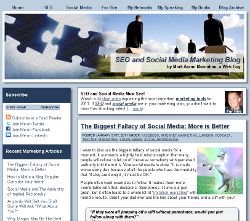
I turned forty today. I’m happy about it, too. It doesn’t really feel like forty quite yet, but I’ve done it! I have lived long enough to have some well-earned gray hair, and a good amount of wisdom that comes with it. For such a young guy, of course.
My forty years have come with a lot of lessons. Having spent well over half of those years as a marketing professional and business owner, I’ve learned a lot about marketing. I’ve shared large volumes of my experiences here on the Internet, and I feel great to say that I’ve helped a lot of people with that experience.
One of the things I learned about marketing is the value of brevity. Keep it short. Keep it easy. Don’t get too confusing with all of your wordiness. I learned it, and then I threw it out the window for the purpose of this blog. Brevity matters when you are selling something, but I am not. If you can embrace some blatant verbosity today, I’ll reward you with some valuable real life marketing lessons.
Did you get that? It’s my birthday, but I’m trying to give you a gift. I guess that’s lesson one. When you give more, you receive more, and it’s an important principle of marketing. It’s a principle that is far beyond most people’s patience threshold, but to the ones who get it, it is invaluable.
I’ve shared a lot of helpful principles and practices of marketing on this blog. Much of it comes directly from things I learned through decades in the marketing profession. I feel good about that, and I know I’ve made an impact. I’ve helped a lot of people reach their goals, both business and personal. I plan to continue that work, but in a different way.
The Announcement That Changed My Life: Sayonara Mediocrity
At forty years old, I decided it is time to change things up. I intended to be fully retired by now, and a few years ago, I was actually well-prepared for it. I had plans to race cars full time, and my work was going to focus only on things I love. My bank is not as big as it used to be after somebody screwed up the world’s economy, so I’m still working. That should not keep me from pursuing the work I love, so I’m doing it … I’m making one of those scary changes I’ve encouraged so many others to make.
As I announced a few weeks ago, I stopped taking new clients (of course, that is unless somebody with really big goals and a ginormous budget comes calling). It’s very liberating. Now I feel even more free than ever if I need to call somebody out for being an apathetic bonehead. I’m also inspired to believe that if I tell you something, you’ll feel confident there is not an underhanded agenda just to sucker you out of your hard-earned money.
A challenging fact of marketing is that the best marketing consultants will never receive as much benefit as the client. It’s why many independent marketing consultants have their own products or services to market, outside of the marketing industry. The best marketers know that marketing is an investment rather than wasted money, and that if they build their own business, they will always be paid far more than by boosting a client’s return on investment.
Sometimes clients will find themselves skeptical about who receives the greatest benefits, but it is the client and not the marketing consultant. I explained this in an article titled “Find Good SEO: Why Good SEO Don’t Seek Your Business“. Being regularly at odds with that inherent negativity and skepticism in the market is why I’m changing things up and creating some significant career moves. No, it’s not because I’m not good at it … I’m just ready to move on to something more positive and inspiring.
Today, more than ever, I hope you will listen up and take some good direction. Give this gritty old marketing guy a chance to help shape your perceptions and understanding of marketing. I serve some pretty good food for thought about marketing, and many easily actionable tasks that you can put to use in minutes. In fact, here are six ways to improve search engine ranking in under one hour. There’s one caveat: they are only useful if you use them.
I have no reason nor desire to lie to you or mislead you, and I cannot recall a time when I intentionally misled anybody about marketing. So slow down and stop worrying about the next thing to click.
Velocity is Great in a Market, But Sometimes You Must Slow Down
Rushing around the Internet looking for the next bit of marketing enlightenment is not where you really want to find yourself in another 15 minutes or half hour … or three months … or next year. That’s what everybody else is doing, and if you think searching the web and looking for the next bottle to rub and hoping a genie will pop out is a better option, you’re likely to get pretty average results.
Settle down and look for the greater benefits. A mathematical fact of the online marketing space is that an average result is abysmal. It’s true! Most companies really stink at reaching an online market, and never get much out of it. I find that it is very often because they don’t slow down – breathe – get some oxygen in their brains and pay attention. They don’t pay attention to their market, and they don’t pay attention to things that can help them to reach their market more effectively. They are often all mouth and no ears, and rushing too hard to get things right that they get it all wrong. That’s them, and I hope you will make the choice to not be one of them.
Honesty in Marketing: It’s Not All Evil!
Marketing is often viewed with a sizable dose of skepticism. If somebody will gain from it, there is a frequent perception that somebody also loses. It’s not true, but this skeptical belief often hurts people in their own marketing, based on how they view marketing as a whole. If I am introduced to something as a result of marketing, and I trade my money because I wanted it, did somebody automatically lose? I got the thing I wanted, and the company marketing to me got what they wanted.
Yes, there are a lot of dirty scoundrels who will lie to you about marketing, but in the big picture, dishonest companies just don’t make it very long. It reminds me of a principle I implemented to create one of my most successful business endeavors, and it was a single word. It came to me when I asked my wife and business partner to summarize what made us stand out from the crowd, and what made us better than the competition. She said “It’s easy, Mark. It all comes down to a single word … Integrity.” That moment will never leave me, and it has provided me a great amount of success.
Marketing Wisdom: It Only Appears Simple
Even today it feels strange and almost surreal to say that I’ve been in marketing for 25 years … but I have. I was raised into marketing, and I was sitting in boardrooms offering my opinions from the time I was a teenager. I started my first company when I was so young that my mother had to sign the legal papers … for years.
It took a long time to make good sense of it all, in business. In fact, I still utterly stink at some points in business, but the part I do understand is marketing. I know from many years of running successful (and some not so successful) businesses that marketing will make or break a company. They don’t make it easy to understand, either. Even in the best universities, they often talk about a lot of theories and concepts, but where the fork meets the food, it takes some stomach-churning hard work to see real success. I know, because I’ve done that, and if you ask me, or any of my peers who have earned anything more than six-digits per year, you will find very few of them who came by it with simplicity.
Stop buying into people’s notions that it is simple. If it was really so simple, it probably wouldn’t be very profitable.
TAM, SAM, SOM, ROI, SEO, SMM, and PECKERs
There are enough acronyms and industry buzz phrases to bring my lunch back to the top of my throat. Some of those acronyms really matter, such as TAM (Total Available Market), SAM (Served Available Market), SOM (Serviceable Obtainable Market), ROI (Return On Investment), and many others. These matter in huge ways, but they are very frequently misunderstood or overlooked because of shortsightedness, which often comes from a frightened accountant who knows little about marketing or how the company actually gets the money to pay their salary.
In small businesses, it is often because, although the person in charge was good enough in their field to start a company, they were not good enough at business to understand that being good at a trade does not mean being good in business. Being good in business means knowing where your weaknesses are, and knowing how to fill those gaps with people who are as good or better at their field of knowledge than you. That’s right, the best business leaders learn to effectively delegate what is out of their league. It’s why I don’t handle my own bookkeeping, and why people in other trades are usually let down when they try their hand at marketing.
Other marketing acronyms are beaten to death, like SEO (search engine optimization) and SMM (social media marketing). These buzz phrases are so popular these days that dishonest people use them to fool companies. In online marketing, they talk about building more website links, but they throw out good ideas of why somebody would actually want to link to their website … and they often hold the absurd notion that more links is always a good thing. The really misinformed marketers will lead you to believe that social media marketing is all about networking and socializing.
This kind of shortsighted and misinformed thinking is why I created my very own acronym for 2012, and I welcome you to read why I’m very proud to call myself a “PECKER” (Profit Engineer and Competition Killer with Extraordinary Resources).
Advertising is Only a Very Small Part of Marketing
I find that a lot of people imagine marketing to mean advertising what they offer for sale. This is only a small part of what makes up marketing. Marketing addresses many other things, including a whole lot of math, creativity, strategy, and so much more. An easy example is to look at anything you have for sale, and answer the question of why you priced it at the level you have. Is it because of its cost to produce? Did you leave it up to the competition to decide your price? Did you ever actually do the research to know what it’s worth – and not just that – to the right audience? Did you get that research just right, or is it really so impossible that you made some costly mistakes by using guesswork instead of basing it on the right factors?
The ways that marketing influences a business are far too numerous to list in a single blog. I hope you’ll think about some of those things you may have overlooked. I welcome you to my blog archive to help get the wheels turning. There are hundreds of articles there, and I think you’ll find them very useful if you slow down.
Throw Out Your Sandwich and Make a New One
I hear a lot of people regurgitating the last thing they heard or read about marketing, and how fresh the latest idea is. I guess maybe it was fresh sometime before it hit a squillion blogs, but now it’s like a day-old tuna sandwich sitting out in the sun.
Great marketing is seldom a matter of seeking the latest and greatest thing. Following trends is important, but following them too closely that you follow the mistakes is often a train wreck in the making. The things that work are not just following what everybody else fervently exclaims will work. Great marketing requires research, testing, and discovering what works – really works – for your company, and being the one all of those trend-talkers are talking about. It is not about tweeting, Facebooking, Flabunctuating … or whatever the next big trend is.
I’ve written volumes about social media, including hundreds of thousands of words, and even a book. I marvel at how many people think it is something new. Did you think social media is new? It’s how I met my wife, well over a decade ago … and many close friends years before that. Social media helped me to grow several of my companies quite abundantly, too, but social media is not a unicorn net or a leprechaun trap.
One of its greatest uses is to listen and learn about what makes your market tick … and then use that information. Many people are too short-sighted to take things to a new level of analysis, and understand what to do with a good analysis. Most are unwilling or unable to dig deep into their creativity and find ways to make their brand stick out like a sexy model passing out free bacon sandwiches and all expense paid trips to “Available-Sexy-Model-and-Free-Bacon-Sandwichville”.
I witness many scared companies making scared decisions, but I’ve watched a lot more scared companies fail than I care to count … and that’s because they don’t count. The ones that count are the ones willing and fearless enough to do what it takes to be more like you want your company to be. Not like the bottle-rubbing, instant-enlightenment-seeking, one shot wonder at the competitor down the street – like you – or at least your vision of you. So stop being scared! Go out on a limb. That’s how people succeed in the real world of business.
Fear of Failure Destroys Marketing Efforts
I know the extreme power of fear. I have witnessed it throughout my career, and I’ve even allowed myself to be a casualty of fear at times. There is nothing easy about making the kind of commitment it requires to be successful. This goes for anything you really want in your life, whether it’s a spouse, a family, a new home, a new car, or an improved bottom line in your business. It takes a leap, but it doesn’t have to be simply on faith.
If you think about your marketing as a foundation of your company, which it really is, you will find yourself on a much stronger path. I know, it’s easy to try and argue the point. The accountants think accounting is the foundation, the attorneys think the legal structure makes the foundation, and the people who created the company think it’s all about the product or service … but that’s really not true.
Businesses simply do not work without being marketed. Even in the most obscure and complex examples you can throw out there, the biggest factor between success and failure of two equal companies really does come down to how well they are marketed.
I Believe You Could Do Better With Your Marketing
How could I put this any more clearly? You can do better! Failure to control your fear impulses and continuing to worry about what will not work is a fast track to failure. Try thinking more along the lines of what you stand to gain, instead of cowering to the fear of what you stand to lose. Then consider what you continue to lose effortlessly because you’re waiting. There is a steep cost of missed business opportunities. In fact, it is often the worst scenario of all. Getting out of your easy chair to face your fears is a huge factor in success, and I know it from experience.
I turned ideas into millions of dollars within only a short time after completing my 8th grade education. It didn’t take an MBA, or however you spell those fancy degrees hanging on the “smart guy’s” wall. It took research, creativity, and a good supplier of balls. I said balls, and you can call me a bad marketer for that … but if you want to know about selling balls – or selling anything else – read this article to get your thinking up and bouncing: “SEO, Social Media, and Marketing Balls”
Stop worrying about the cost of marketing done right, and start focusing on the positive outcome if you do. There are plenty of chickens out there, and I hope you aren’t one of them … and if you are, I hope you’ll make a commitment to change it.
Some Personal Lessons I Learned About Marketing
When I consider why I advocate for people to take their marketing more seriously and stop waiting for “something” to change, I look inward at how it has changed my life. I imagine the things that would never have happened without marketing, and I’ll give you a glimpse.
- I dropped out of school at age 15 to start my first company. That could have gone quite miserably without good marketing.
- I retired (the first time) at age 25. Without good marketing and having guts, that would have sucked for the average 15 year old dropout.
- I met my wife in 2000 by using good marketing skills … online … with social media. Without that, I would not have the three wonderful kids I enjoy so much today.
- I learned to competitively control automobiles at over 170 miles per hour (270+ KPH). It took a lot of marketing to own a race team. It is what I wanted, and because of good marketing, I made it happen.
- I learned that making everybody happy is not required. Making the right ones happy is a whole lot more productive.
- I learned that without climbing out on a limb and having the courage to embrace the immense value of marketing, I would have very few of the things that bring me joy and sustenance today.
- I learned that sharing what I know feels very good, but even better when people will use it to improve their own lives.
- I learned a whole lot more, but that’s why I have an archive, and that’s why this blog is not finished yet. Please subscribe if you want to keep learning with me.
I have no intention of explaining all that I have learned about marketing in a single blog article. That would be impossible. I hope that you will be willing to take a good look and accept some useful tips from a guy who has been around the block. I hope you will bookmark my blog archive and keep coming back to feed your brain with some useful marketing advice. I also hope you will subscribe for more to come soon. Don’t miss the point that it will make a lot more difference to your business than it will mine.
I also welcome you to get to know me. I’m a very approachable guy who loves the field of marketing, and I’m always delighted to be helpful.
Podcast: Play in new window | Download








